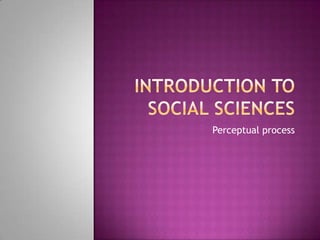
Lecture 3 perceptual process
- 3. Perception is a creative process. It is not simply observing, hearing or sensing what is out there in your environment. It involves the assigning of meaning to these stimuli. Infact, experiences are more a product of interpretations rather than the information itself.
- 4. Schemata are the patterns we develop over time to organize incoming information. It helps to organize the comprehension of the events. It gives us a way to construct or assign meaning to new information. Scripts also affect the expectations about the order of the events. They help fill in the missing blanks in a particular way. It is also called our reality.
- 7. Isthe script something we sense or is it all in our head ? Probably both, and both are important in creating our realities.
- 8. Ourscripts are shaped by our experiences, knowledge, needs, values and beliefs. New incoming information is tested against them. Itcan reinforce preexisting scripts, make a pre existing script clear, add a new element to it, or restructure it.
- 9. Scripts / schemas/ realities are formed on past. Evenrecent past has an effect on our expectations. E.g. news about a muder, 3 headlines, one suggests suspect is guilty, one is neutral, one suggests suspect is innocent. All three have an impact on our perception about the suspect.
- 10. Sometimeswe do not have a set of previous experiences. E.g. watching a new tv station, listening to a new song etc. Expectations are developed on the basis of initial bits of information received e.g the first scene of a drama, first page of a novel, starting music of a song
- 12. Attitude: The way a person thinks or acts depending on beliefs, values, and feelings. Attitudecreates a set or expectations of that affects perception. E.g. more violations by the opposite team in sports. Selectiveperception – process of screening out information not consistent with our schemas.
- 14. Consistencytheory – avoiding inconsistency by misinterpreting any new information that might be inconsistent with our attitudes. Principle of least effort: It is easier to perceive messages that are consistent with what you perceive. It takes more effort to perceive a message that is unexpected or contrary to the way you see the world.
- 15. Needsare important factors when processing information. Information relevant to needs is perceived more than other information. This is true specially in the case of need for concrete things such as food.
- 20. Informationprocessing is affected by our reference groups which include Family, friends, peers etc. Those with whom we associate Those with whom we want to associate Informationprocessing changes with the reference group E.g. munni badnam hui with friends, family, kids and adults, each is different experience
- 21. Referencegroups shape our sets or expectations for certain kinds of information. Reference group also effect our opinions. We form an opinion when confronted for it or if we think we will talk to someone else. The opinion that we develop is based on who the other person is and what our relationship is to that person.
- 22. Personalitytraits – the more close-minded a person is, the more he is affected by authority figures and vice versa. Language and information processing – Language gives meaning to your experiences. If you can assign a label to your experience, it becomes meaningful. If not, there is difficulty in believing.
- 23. Effects of chunking memory Information is stored in chunks or bloks in our memory. Chunks can be small, medium, or large. The larger the chunk of information, the greater the information loss.
- 24. Prior Exposure: It is easier to learn things that you had learned before and forgotten, than those you never learned about. Repetition and Persuasion: Repetition of a persuasive message causes people to agree more rapidly with the statement of opinion.
- 25. Gaps:We tend to fill missing gaps based on our previous knowledge of similar scenarios. Iconicity:The degree to which the a symbol is similar to which it represents. The nearer the symbol to the representation, the easier to understand.
- 26. Family
- 29. Primacy effect If you read or hear a series of ideas within a relatively short period of time, the earliest ideas stick best to in your memory. Recency effect If you read or hear a series of ideas within a relatively short period of time, the latest (most recent) ideas stick best to in your memory.
- 30. No interest or opinion When we are not interested in an issue or we have no opinion, we tend to be influenced by the information we receive first. High interest When we are highly interested and need to understand an issue, the order of information has little or no influence
- 31. Suspicion of external influence When we suspect that someone is trying to influence us, the impact of initial bits of information is reduced. Involvement in conversation If we become involved in an issue, taking any position based on the information received up to that point, the ultimate effect of that earlier information is increased. The more public that commitment, the greater the influence.
- 32. Distraction Time and distraction created by other activities in the intervals between bits of information, the most recent bits of information are most remembered.